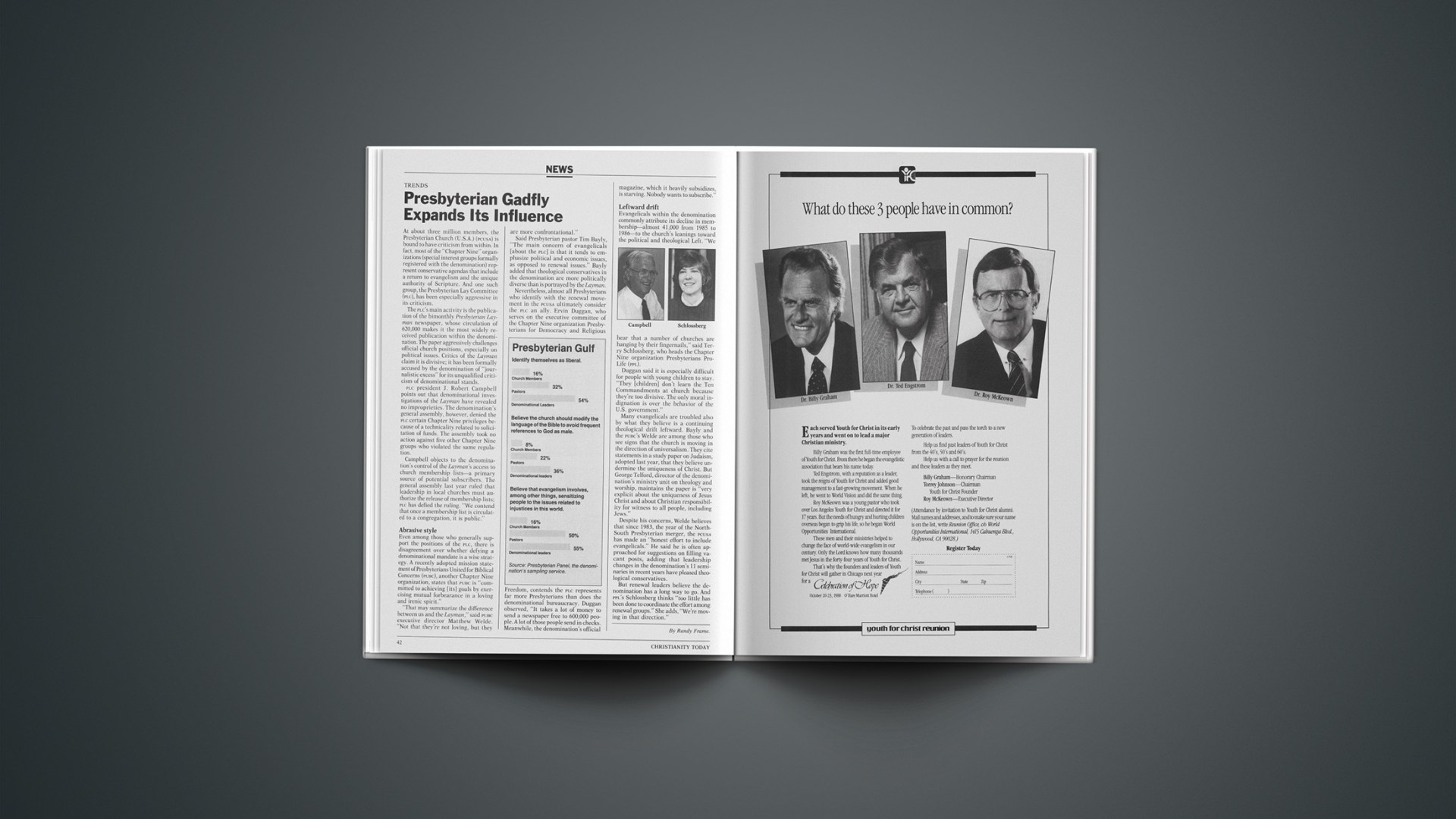At about three million members, the Presbyterian Church (U.S.A.) (PCUSA) is bound to have criticism from within. In fact, most of the “Chapter Nine” organizations (special interest groups formally registered with the denomination) represent conservative agendas that include a return to evangelism and the unique authority of Scripture. And one such group, the Presbyterian Lay Committee (PLC), has been especially aggressive in its criticism.
The PLC’S main activity is the publication of the bimonthly Presbyterian Layman newspaper, whose circulation of 620,000 makes it the most widely received publication within the denomination. The paper aggressively challenges official church positions, especially on political issues. Critics of the Layman claim it is divisive; it has been formally accused by the denomination of “journalistic excess” for its unqualified criticism of denominational stands.
PLC president J. Robert Campbell points out that denominational investigations of the Layman have revealed no improprieties. The denomination’s general assembly, however, denied the PLC certain Chapter Nine privileges because of a technicality related to solicitation of funds. The assembly took no action against five other Chapter Nine groups who violated the same regulation.
Campbell objects to the denomination’s control of the Layman’s access to church membership lists—a primary source of potential subscribers. The general assembly last year ruled that leadership in local churches must authorize the release of membership lists; PLC has defied the ruling. “We contend that once a membership list is circulated to a congregation, it is public.”
Abrasive Style
Even among those who generally support the positions of the PLC, there is disagreement over whether defying a denominational mandate is a wise strategy. A recently adopted mission statement of Presbyterians United for Biblical Concerns (PUBC), another Chapter Nine organization, states that PUBC is “committed to achieving [its] goals by exercising mutual forbearance in a loving and irenic spirit.”
“That may summarize the difference between us and the Layman,” said PUBC executive director Matthew Welde. “Not that they’re not loving, but they are more confrontational.”
Said Presbyterian pastor Tim Bayly, “The main concern of evangelicals [about the PLC] is that it tends to emphasize political and economic issues, as opposed to renewal issues.” Bayly added that theological conservatives in the denomination are more politically diverse than is portrayed by the Layman.
Nevertheless, almost all Presbyterians who identify with the renewal movement in the PCUSA ultimately consider the PLC an ally. Ervin Duggan, who serves on the executive committee of the Chapter Nine organization Presbyterians for Democracy and Religious Freedom, contends the PLC represents far more Presbyterians than does the denominational bureaucracy. Duggan observed, “It takes a lot of money to send a newspaper free to 600,000 people. A lot of those people send in checks. Meanwhile, the denomination’s official magazine, which it heavily subsidizes, is starving. Nobody wants to subscribe.”
Leftward Drift
Evangelicals within the denomination commonly attribute its decline in membership—almost 41,000 from 1985 to 1986—to the church’s leanings toward the political and theological Left. “We hear that a number of churches are hanging by their fingernails,” said Terry Schlossberg, who heads the Chapter Nine organization Presbyterians Pro-Life (PPL).
Duggan said it is especially difficult for people with young children to stay. “They [children] don’t learn the Ten Commandments at church because they’re too divisive. The only moral indignation is over the behavior of the U.S. government.”
Many evangelicals are troubled also by what they believe is a continuing theological drift leftward. Bayly and the PUBC’S Welde are among those who see signs that the church is moving in the direction of universalism. They cite statements in a study paper on Judaism, adopted last year, that they believe undermine the uniqueness of Christ. But George Telford, director of the denomination’s ministry unit on theology and worship, maintains the paper is “very explicit about the uniqueness of Jesus Christ and about Christian responsibility for witness to all people, including Jews.”
Despite his concerns, Welde believes that since 1983, the year of the North-South Presbyterian merger, the PCUSA has made an “honest effort to include evangelicals.” He said he is often approached for suggestions on filling vacant posts, adding that leadership changes in the denomination’s 11 seminaries in recent years have pleased theological conservatives.
But renewal leaders believe the denomination has a long way to go. And PPL’S Schlossberg thinks “too little has been done to coordinate the effort among renewal groups.” She adds, “We’re moving in that direction.”
By Randy Frame.










